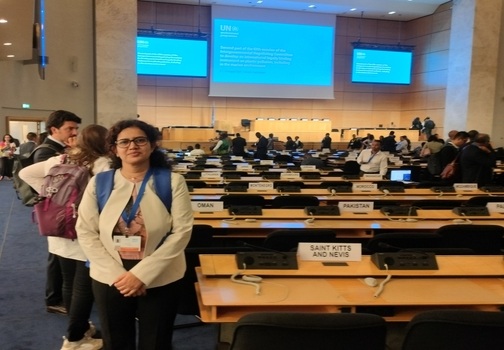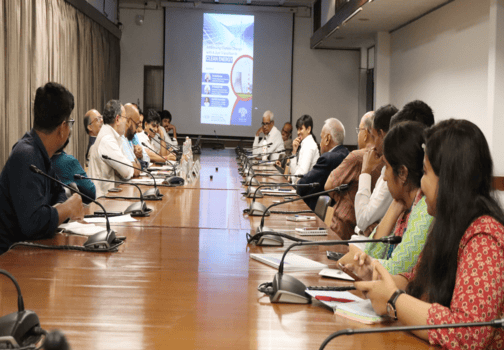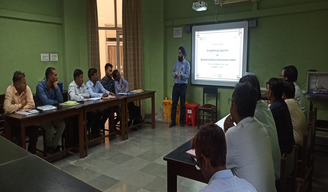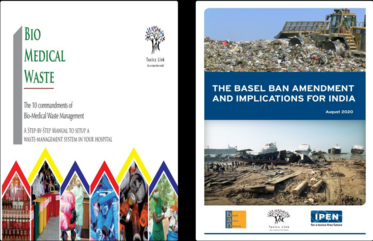EXPANSION OF NATIONAL SURVEILLANCE PROGRAMMES FOR PESTICIDE RESIDUE TESTING
GOVERNMENT OF INDIA
MINISTRY OF HEALTH AND FAMILY WELFARE
DEPARTMENT OF HEALTH AND FAMILY WELFARE
RAJYA SABHA
UNSTARRED QUESTION NO. 2016
TO BE ANSWERED ON 18TH MARCH, 2025
EXPANSION OF NATIONAL SURVEILLANCE PROGRAMMES FOR PESTICIDE
RESIDUE TESTING
2016. SHRI RAMBHAI HARJIBHAI MOKARIYA:
SHRI SUBHASH BARALA:
Will the Minister of HEALTH AND FAMILYWELFARE be pleased to state:
(a) the steps taken to expand the National Surveillance Programmes and enhance laboratory capacities for Pesticide Residue Testing in the country;
(b) the manner in which Government is planning to control the problem of off-label and excessive pesticide use by farmers;
(c) the measures being taken to prevent the sale and distribution of spurious and unregulated pesticides;
(d) whether Government is planning to provide incentives or subsidies for farmers adopting
the sustainable options such as bio-pesticides and Integrated Pest Management (IPM); and
(e) if so, the details thereof?
ANSWER
THE MINISTER OF STATE IN THE MINISTRY OF HEALTH AND FAMILY WELFARE
(SHRI PRATAPRAO JADHAV)
(a) & (b): The Department of Agriculture & Farmers Welfare has informed that they are implementing, “Monitoring of Pesticide Residues at National Level” (MPRNL) project since 2005-06 to determine the levels of pesticide residues in food commodities and water with the participation of laboratories representing various Ministries.
Under the project, the samples of vegetables, fruits, spices, cereals, pulses, herbs, fish/marine, meat and egg, tea and milk are collected from different parts of the country by 35 participating laboratories and analysed by National Accreditation Board for Testing and
Calibration Laboratories (NABL) accredited testing laboratories for the possible presence of pesticide residues. The monthly reports of the samples collected are shared with the State Agricultural Departments to educate the farmers to control the problem of off-label and excessive pesticide use by farmers and Integrated Pest Management (IPM).
Further, Ministry of Agriculture and Farmers Welfare, through its Central Integrated Pest Management Centers (CIPMCs), Krishi Vigyan Kendras (KVKs) and State Agriculture Departments, undertakes various training programs, to educate and train farmers, state agriculture extension functionaries, and pesticide dealers on the safe handling practices of pesticides, control the use of off-label pesticides, need-based & judicious use of pesticides and also the use of chemical pesticides as a last resort only. In order to enhance laboratory capacities for Pesticide Residue Testing in India following steps have been taken by FSSAI:
• There are 159 FSSAI notified primary laboratories capable for testing of Pesticide Residues in Food Commodities.
• FSSAI under it’s “Strengthening of Food Testing Laboratories” (SoFTeL) scheme has supported laboratories for procurement of High End Equipment which helps in testing pesticide residues in food commodities.
• Additionally, 285 Mobile Food Testing Labs are deployed across 35 States/UTs for on -site testing of food products.
(c): The Department of Agriculture and Farmers Welfare (DA&FW) has implemented various provisions of the Insecticides Act, 1968 to ensure supply of quality pesticides to farmers in the country. Rule 9 of the Insecticides Rules, 1971 provides that no insecticide can be manufactured, stocked, sold or exhibited for sale without a license granted by the licensing officer appointed by the State Governments. The licence is granted after satisfying the availability of necessary plant and machinery, safety devices, first aid-facility, in the premises where the insecticides is proposed to be manufactured or sale or distribution.
Further, to ensure that quality pesticides are available in the market, under section 20 of the Insecticide Act, 1968, 12,523 officers of various State Governments and Central Government are notified as Insecticide Inspectors and they have been vested with powers to search premises, seize documents, stop distribution or sale of insecticides. These inspectors regularly conduct inspections of the manufacturing firms and dealers/retailers in the area of their jurisdiction to check the sale of any low quality/misbranded/unregistered pesticides and take insecticide samples for quality analysis. If any insecticide sample gets failed in the testing, then, prosecution is launched against the manufacturer or dealer as per the provisions of Insecticide Act, 1968.
(d) & (e): Government of India promotes sustainable agriculture and IPM practices as a priority in the Crop Protection Programme. Further, the Government continues to promote bio-pesticides and biological control agents through CIPMC initiatives, training programs, and field demonstrations. Further, Government of India under Section 9(3B) of the Insecticides Act, 1968 has undertaken various steps to promote the use of bio pesticides like simplified guidelines and minimum fee for the registration and provisional registration for bio-pesticides.






